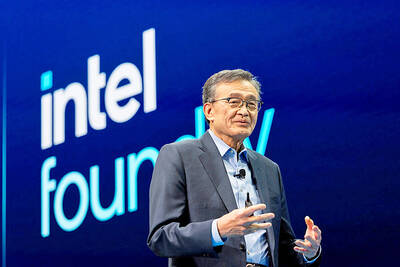Developers and builders are to launch NT$200 billion (US$6.66 billion) of presale projects and new homes in the traditional “hot sales” season that starts on Sept. 28 this year, with small apartments the focal point, the online housing unit of Addcn Technology Co Ltd (數字科技) said in a report.
Government-led urban renewal projects are expected to dominate northern Taiwan, while improving confidence is to underpin the market in the south of the nation during the month-long season, which usually starts in the middle of September.
New construction volume might approach NT$30 billion in Taipei, where a residential complex of nearly 1,000 ping (3,305.8m2) in Wenshan District (文山) is to contribute NT$8 billion alone, the report said.
The complex will offer units of between 25 ping and 55 ping.
Chong Hong Construction Co (長虹建設) is pairing up with one of its peers to offer residential apartments of 28 ping and 68 ping in Taipei’s Zhongshan District (中山).
In New Taipei City, Kindom Construction Corp (冠德建設) will launch a presale project on the site of the former Sindian (新店) administration hall that features mixed-use buildings with residential space priced at NT$700,000 per ping, the report said.
Li Shinn Asset Management Group (立信機構) has NT$4 billion in new housing projects in Banciao District (板橋), while its rivals have two to four-bedroom apartments priced at NT$400,000 per ping, according to the report.
Taichung has the largest volume of homes and projects of the six special municipalities, at NT$50 billion, as property funds flow into central Taiwan, it said.
Cathay Real Estate Development Co (國泰建設), Pau Jar Group (寶佳機構), Ho Yi Construction Co (和宜建設) and Herzu Construction Co (和築建設) all plan to unveil projects in Taichung this month or next.
Listed developers are expected to increase their presence in southern Taiwan with new projects valued at NT$17 billion, the report said.
In Tainan, Highwealth Construction Corp (興富發) has a presale project with 1,100 residential units, which is expected to generate NT$6.5 billion in revenue, it said.
King’s Town Construction Co (京城建設) plans to turn a plot of land of nearly 1,000 ping into a residential complex, while Kuoyang Construction Co (國揚建設) is adding townhouses, the report said.
Taipei-based developer JSL Group (甲山林) is to make its debut in Kaohsiung by launching two projects that could total NT$5 billion in sales, while Highwealth is expected to offer a large residential complex with 500 apartments of between 22 ping and 39 ping near the Kaohsiung Museum of Fine Arts (高雄市立美術館), the report said.

Mercuries Life Insurance Co (三商美邦人壽) shares surged to a seven-month high this week after local media reported that E.Sun Financial Holding Co (玉山金控) had outbid CTBC Financial Holding Co (中信金控) in the financially strained insurer’s ongoing sale process. Shares of the mid-sized life insurer climbed 5.8 percent this week to NT$6.72, extending a nearly 18 percent rally over the past month, as investors bet on the likelihood of an impending takeover. The final round of bidding closed on Thursday, marking a critical step in the 32-year-old insurer’s search for a buyer after years of struggling to meet capital adequacy requirements. Local media reports

TECHNOLOGICAL RIVALRY: The artificial intelligence chip competition among multiple players would likely intensify over the next two years, a Quanta official said Quanta Computer Inc (廣達), which makes servers and laptops on a contract basis, yesterday said its shipments of artificial intelligence (AI) servers powered by Nvidia Corp’s GB300 chips have increased steadily since last month, should surpass those of the GB200 models this quarter. The production of GB300 servers has gone much more smoothly than that of the GB200, with shipments projected to increase sharply next month, Quanta executive vice president Mike Yang (楊麒令) said on the sidelines of a technology forum in Taipei. While orders for GB200 servers gradually decrease, the production transition between the two server models has been

US sports leagues rushed to get in on the multi-billion US dollar bonanza of legalized betting, but the arrest of an National Basketball Association (NBA) coach and player in two sprawling US federal investigations show the potential cost of partnering with the gambling industry. Portland Trail Blazers coach Chauncey Billups, a former Detroit Pistons star and an NBA Hall of Famer, was arrested for his alleged role in rigged illegal poker games that prosecutors say were tied to Mafia crime families. Miami Heat guard Terry Rozier was charged with manipulating his play for the benefit of bettors and former NBA player and

BETTER THAN EXPECTED: The firm’s Q3 results exceeded its projections, based on ‘the underlying strength of our core markets,’ chief financial officer Dave Zinsner said Intel Corp returned to profitability and gave an upbeat revenue forecast after PC demand grew, suggesting that it is making progress on a long and challenging comeback attempt. In the third quarter, revenue rose 3 percent to US$13.7 billion. The Santa Clara, California-based company posted its first quarterly net income since the end of 2023, with earnings per share of US$0.23, excluding some items. Analysts had estimated sales of US$13.2 billion and earnings per share of US$0.01 on average, according to data compiled by Bloomberg. Fourth-quarter sales would be roughly US$13.3 billion, the company said in a statement on Thursday. Intel shares gained about